NOTE: This page is regularly updated to include new data and best reflect current hiring trends. We outline our methodology and provide a bit of context about who we are at the end of the report.
While earning a bachelor’s degree is a great way to start your career, it’s not the right choice for everyone.
In certain industries, relevant work experience, training, internships, and certifications are just as important, if not more important, than a four-year degree.
Below is a list of high-paying jobs with good projected job growth that don’t require a 4-year college degree to apply:
| Job | Median Annual Salary | Number of Jobs | Estimated Job Growth | Level of Education |
|---|---|---|---|---|
| Airline and commercial pilot | $148,900 | 142,600 | 4% | Vocational school, associate's degree |
| Information security analyst | $112,000 | 168,900 | 32% | High school diploma, vocational school, certifications |
| Elevator and escalator installer and repairer | $99,999 | 25,100 | 1% | High school diploma |
| Special effects artist and animator | $98,950 | 89,300 | 8% | High school diploma, cosmetology license, certifications |
| Transportation, storage, and distribution manager | $98,560 | 14,600 | 8% | Certification, years of on the job experience |
| First-line supervisors of police and detective | $96,290 | 4,300 | 3% | High school diploma, policy academy training |
| Radiation therapist | $89,530 | 15,900 | 2% | High school diploma, associate’s degree |
| Subway and streetcar operator | $88,260 | 300 | 4% | High school diploma, technical training, certifications |
| Electrical power-line installer and repairer | $82,340 | 122,400 | 3% | High school diploma |
| Dental hygienist | $81,400 | 219,000 | 7% | High school diploma, vocational school, associate's degree |
| Web developer | $80,730 | 216,700 | 16% | High school diploma |
| Medical sonographer | $78,210 | 142,800 | 10% | Vocational school, associate's degree |
| Police and/or detective | $69,160 | 808,700 | 3% | High school diploma, police training academy |
| Flight attendant | $63,760 | 111,100 | 11% | High school diploma, flight attendant training program |
| Lodging manager | $61,910 | 50,800 | 7% | High school diploma |
| Property, real estate, and community association manager | $60,670 | 429,600 | 5% | High school diploma |
| Electrician | $60,240 | 762,000 | 6% | High school diploma, apprenticeship program |
| Telecommunications technician | $60,190 | 299,300 | 6% | High school diploma |
| Industrial machinery mechanic | $59,470 | 507,900 | 13% | High school diploma |
| Computer support specialist | $59,660 | 914,110 | 5% | High school diploma |
1. Airline and commercial pilot
- Median annual salary: $148,900
- Number of jobs: 142,600
- Estimated job growth (2022–2032): 4%
Commercial pilots operate various types of aircraft, such as planes and helicopters.
Besides regularly scheduled flights, commercial pilots might handle other flying-related tasks like spraying crops or other areas from the air, flying private trips on demand, and leading sightseeing tours from above.
Most pilot jobs ask for training in vocational schools and sometimes an associate’s degree.
You’ll also need on-the-job training and must meet the Federal Aviation Administration (FAA) requirements, but in 2 years or less, you can pass the necessary certifications and reach the 1,500 flight hours necessary for this role.
2. Information security analyst
- Median annual salary: $112,000
- Number of jobs: 168,900
- Estimated job growth (2022–2032): 32%
Information security analysts work to protect companies’ sensitive data from being stolen or damaged by cyber-attacks.
Whether you’re self-taught or gained the necessary knowledge through related paid work, you can apply to security analyst positions without a bachelor’s in computer science.
You can enter a vocational school with a cybersecurity program right after high school. Many IT departments also offer on-the-job training where you can observe current cybersecurity analysts at work.
Prove to hiring managers that you have the skills necessary by boosting your resume with the following certifications:
3. Elevator and escalator installer and repairer
- Median annual salary: $99,999
- Number of jobs: 25,100
- Estimated job growth (2022–2032): 1%
If you don’t mind working in cramped spaces, consider a career as an elevator and escalator technician. These professionals often work in narrow passageways, machine rooms, and elevator shafts and help to install, repair, and maintain these areas.
Elevator technicians generally only need a high school diploma or a GED combined with on-the-job training through an apprenticeship to get a job. Most states also call for workers to be licensed, so check the rules in your state before submitting any job applications.
4. Special effects artist and animator
- Median annual salary: $98,950
- Number of jobs: 89,300
- Estimated job growth (2022–2032): 8%
An SFX make-up artist is a specialist who applies make-up, prosthetics, and appliances on actors to turn them into film characters (think Avatar or Wednesday Adams!).
Most positions will require certifications or other credentials, like a makeup program, or at the very least, a cosmetology license to confirm you’ve got some foundational knowledge of the industry and have a well-rounded portfolio.
However, you don’t need a degree to get started in this field. Your earning potential varies depending on your niche and the experience you get over the years, as well as the company you work for (or if you work freelance).
5. Transportation, storage, and distribution manager
- Median annual salary: $98,560
- Number of jobs: 14,600
- Estimated job growth (2022–2032): 8%
Transportation managers make sure cargo (and sometimes people) are transported safely and efficiently.
Most of these jobs demand a bachelor’s degree, but some don’t. To be considered for entry-level transport manager jobs without a bachelor’s degree, you’ll likely complete a certification program (like a transportation certification program) on top of training.
To qualify for management roles like this one, you’ll need an average of 5 years of work experience in a related field like logistics and supply chain management.
6. First-line supervisors of police and detective
- Median annual salary: $96,290
- Number of jobs: 4,300
- Estimated job growth (2022–2032): 3%
These professionals oversee and coordinate police force members and their activities by ensuring everyone is following law enforcement procedures and meeting a community’s safety goals. This job is a solid choice for people who excel in decision-making and have a strong sense of justice.
Leadership roles like this often require several years of experience in the police force by training at a police academy. While some college education is helpful, many in this role start with just a high school diploma and work their way up.
7. Radiation therapist
- Median annual salary: $89,530
- Number of jobs: 15,900
- Estimated job growth (2022–2032): 2%
Radiation therapists administer radiation treatments for cancer and other illnesses.
Most radiation therapist positions ask for an associate’s degree in radiation therapy, but you can enter a radiation therapy program with a high school diploma, associate’s degree, or GED. You’ll also need additional licensing or certifications depending on your state, as well as a national certification before you can start working.
If you want to pursue a career in the healthcare industry without a degree, choose high school electives related to math, science, and health. With a good GPA and specializing in courses like these, you’ll be better positioned to enroll in an accredited program that you’re interested in.
8. Subway and streetcar operator
- Median annual salary: $88,260
- Number of jobs: 300
- Estimated job growth (2022–2032): 4%
As cities grow, so does the need for reliable public transport. Operators drive and navigate subways or streetcars on a set schedule — while ensuring passenger safety at all times.
To land this role, you’ll need at least a high school diploma and then training will be provided on the job. You can apply for entry-level positions in public transit agencies, and listing a clean driving record and excellent customer service skills will come in handy.
9. Electrical power-line installer and repairer
- Median annual salary: $82,340
- Number of jobs: 122,400
- Estimated job growth (2022–2032): 3%
This role involves installing, maintaining, and repairing the power grids and lines that transmit electricity from power plants to homes and businesses.
The job demands physical strength, attention to safety, and the willingness to work in outdoor conditions.
Typically, a high school diploma is the starting point, but further technical training, such as a diploma in electrical technology or a similar field, is highly beneficial.
Apprenticeships are common and provide essential hands-on experience. Prospective workers should also consider getting industry-recognized certifications, such as the Electrical Training Alliance Certification, which can significantly enhance their chances of getting hired in the field.
10. Dental hygienist
- Median annual salary: $81,400
- Number of jobs: 219,400
- Estimated job growth (2022–2032): 7%
Dental hygienists are health professionals who help treat oral diseases. However, let’s not confuse hygienists with dentists, who need at least a bachelor’s degree and additional training in dental school.
To secure a job as a dental hygienist without a bachelor’s degree, you can enter an accredited dental hygienist school with only a high school diploma or GED and acquire additional licensing (with requirements varying by state) from the Commission on Dental Accreditation (CODA).
More commonly, you can also get an associate’s degree or attend a vocational school where you can get training that meets industry standards and helps you prepare for a career as a dental hygienist.
11. Web developer
- Median annual salary: $80,730
- Number of jobs: 216,700
- Estimated job growth (2022–2032): 16%
Are you interested in working with code? Web developers create websites that not only look good, but work well too. They can either be self-employed or work in-house at an agency (for example, computer systems design or advertising). In fact, if you’re a fan of working from home, web development is one of the best jobs that lets you do just that.
Education requirements for web developers can vary, but many employers accept applicants with a high school diploma. Successful web developers possess a strong desire to learn, troubleshooting skills, and great attention to detail.
So if you show employers you’re able to teach yourself new programming languages by taking free online courses or graduating from a boot camp, you’ll be in good shape.
12. Medical sonographer
- Median annual salary: $78,210
- Number of jobs: 142,800
- Estimated job growth (2022–2032): 10%
Medical sonographers operate special imaging equipment to create images of body organs and conduct tests in hospitals, physicians’ offices, or medical and diagnostic laboratories.
If you’re interested in the role, you can apply to an accredited sonography program at a vocational school or community college right after high school and earn an associate’s degree or a postsecondary certificate.
Once you’ve earned formal education, you’ll need some hands-on clinical experience before getting the necessary licensing to work.
Certifications from the American Registry for Diagnostic Medical Sonography (ARDMS) are highly regarded by healthcare facilities and can help you stand out from other applicants.
13. Police and/or detective
- Median annual salary: $69,160
- Number of jobs: 808,700
- Estimated job growth (2022–2032): 3%
Police officers and detectives enforce public safety and order. Their responsibilities are diverse and can include patrolling communities, investigating crimes, and enforcing laws.
The entry point typically requires at least a high school diploma, followed by training at a police academy. Some roles, especially in detective work, might require some college coursework or a degree.
14. Flight attendant
- Median annual salary: $63,760
- Number of jobs: 111,100
- Estimated job growth (2022–2032): 11%
Being a flight attendant is a career that offers unique opportunities for travel as well as interacting and working alongside diverse groups of people.
To be a good fit, you’ll need excellent customer service skills, a high school diploma, and a completed flight attendant training program before you can apply.
Also, airlines often provide their own training programs once you’re hired. To stand out, speaking a second language and having prior customer service experience will be helpful.
15. Lodging manager
- Median annual salary: $61,910
- Number of jobs: 50,800
- Estimated job growth (2022–2032): 7%
Lodging managers ensure that guests enjoy their stay at hotels or similar facilities. They manage and coordinate activities to ensure the establishment runs smoothly and profitably.
While a high school diploma is often sufficient to enter the field, many lodging managers have some postsecondary education or a degree in hospitality or hotel management.
Experience in various hotel operations, from front desk to housekeeping, can also provide a well-rounded foundation for this position.
16. Property, real estate, and community association manager
- Median annual salary: $60,670
- Number of jobs: 429,600
- Estimated job growth (2022–2032): 5%
This role involves handling the operations of residential, commercial, or industrial properties — essentially managing the spaces where people live and work.
Having a high school diploma is a starting point, with many in the field gaining expertise through on-the-job experience.
Additional certifications in property or real estate management, which are offered by several professional organizations, can also enhance your credentials.
17. Electrician
- Median annual salary: $60,240
- Number of jobs: 762,000
- Estimated job growth (2022–2032): 6%
Electricians are responsible for installing, maintaining, and repairing electrical systems in homes, businesses, and other settings.
Starting with a high school diploma, the path to becoming a skilled electrician typically involves completing an apprenticeship program, which combines paid on-the-job training with classroom instruction. Many states also require electricians to be licensed, which involves passing an exam.
18. Telecommunications technician
- Median annual salary: $60,190
- Number of jobs: 299,300
- Estimated job growth (2022–2032): 6%
Telecommunications technicians are vital in keeping communication networks up and running. With a high school diploma and specialized training, you can install and maintain the infrastructure that provides phone and internet connectivity.
This role often requires fieldwork and technical problem-solving skills and is well-suited for people who are interested in technology and enjoy working both indoors and outdoors.
Starting in entry-level positions within telecommunications companies provides practical, on-the-job experience. Also, pursuing specialized certification programs can greatly enhance your skills and marketability in this field.
19. Industrial machinery mechanic
- Median annual salary: $59,470
- Number of jobs: 507,900
- Estimated job growth (2022–2032): 13%
Industrial machinery mechanics make sure machines work the way they should by detecting and correcting errors before machine or product damage occurs.
You can enter this field with just a high school diploma, and after a few years of on-the-job training, you’ll be a full-fledged industrial machinery mechanic.
Although some jobs call for an associate’s degree in industrial maintenance, many do not.
20. Computer support specialist
- Median annual salary: $59,660
- Number of jobs: 914,110
- Estimated job growth (2022–2032): 5%
Computer support specialists provide technical assistance, solve computer problems, and ensure the smooth functioning of computer systems.
Although some employers prefer candidates with some college or certification, a high school diploma, along with some IT knowledge, can be enough to start in this field.
How to land a high-paying job without a degree
Keep in mind that “no degree” doesn’t mean no education is required.
Having relevant work experience, training, and necessary certifications shows employers you have what it takes to succeed in your career of choice.
Here are some of the options available for those interested in the highest-paying jobs without a degree:
1. Pursue alternative education
Certificate programs allow you to answer market demand more quickly than college degree-holding job seekers. Joining a certificate program means you can earn the necessary job qualifications in a shorter amount of time and earn a higher salary sooner.
These alternatives to college degrees will prepare you with the knowledge and hands-on experience you need to be successful:
- associate degrees
- certificate programs from trade schools or technical schools
- short-term courses
- coding and non-technical boot camps
- professional training (also called vocational training)
- apprenticeships
2. Get training to enter the workforce fully prepared
Vocational training schools offer the practical training and theoretical knowledge necessary to quickly enter the workforce. And, they’re significantly cheaper than a 4-year degree.
Training schools used to be limited to training for jobs in industries such as the automotive industry, but have since expanded to many other industries like tourism management or computer network management.
When looking through listings during a job hunt, job seekers often make the mistake of thinking that only paid positions count toward the necessary experience listed in job ads.
However, through vocational training combined with relevant experiences such as personal projects and internships, you can pick up valuable new skills. Paired with the right resume format, you’ll strengthen your resume’s resume work experience section.
3. Do your research
If you haven’t earned your GED or high school diploma yet, look into high-paying jobs for teens or even summer jobs for teens in the meantime to gain critical work experience that can set you apart from other applicants down the line.
You can also try meeting more professional connections this year by actively seeking informational interviews on online platforms like LinkedIn or attending networking events in your area. Often, these professionals can help you get a better idea of what the job hunt entails and give you a leg up on future referrals.
If you’re at the job hunting stage and are unsure of how to properly format your resume, take a look at resume samples to get inspired or fill out a resume template appropriate for your industry and your level of experience.
Methodology
The primary data for this study was sourced from the U.S. Bureau of Labor Statistics (BLS), particularly from their Occupational Employment Statistics and Employment Projections. The focus was on occupations not requiring a college degree, including those with education requirements ranging from a high school diploma to some college education but no degree.
Our selection was based on two key criteria: a minimum U.S. median annual salary of $56,240 and high growth projections as well as those with more stable, little-change scenarios. The occupations were then sorted in descending order of their median annual wage, and the top 20 were selected for detailed analysis. Our researchers used the most recent data available at the time of writing to ensure that the analysis reflects the current labor market trends as closely as possible.
Limitations
The study is limited to occupations in the United States and may not reflect global trends. Please note that labor market conditions are subject to change, and the data reflects the situation as of 2024.
Sources
- U.S. Bureau of Labor Statistics, “Occupational Employment and Wage Statistics” & “Occupation Finder”
About Resume Genius
Since 2009, Resume Genius has combined innovative technology with leading industry expertise to simplify the job hunt for people of all backgrounds and levels of experience.
Resume Genius’s easy-to-use resume builder and wide range of free career resources, including resume templates, cover letter samples, and resume writing guides, help job seekers find fulfilling work and reach their career goals. Resume Genius is led by a team of dedicated career advisors and HR experts and has been featured in The New York Times, Forbes, CNBC, and Business Insider.
For media inquiries, please contact us.

















